Author: Martin Trust Center
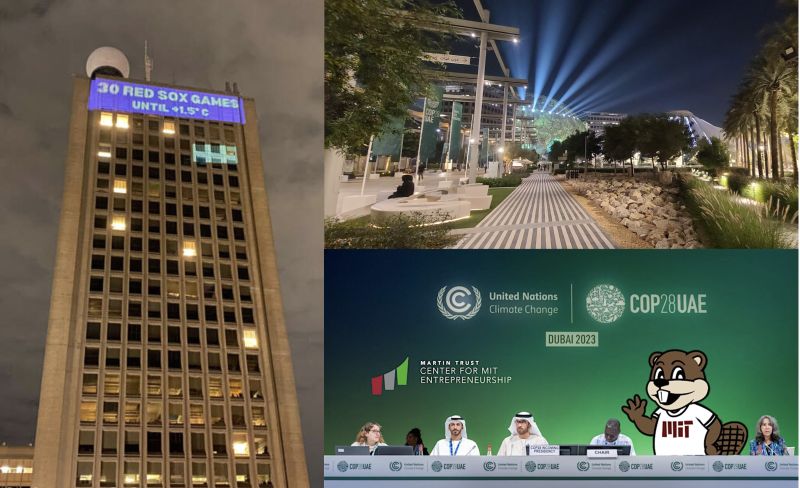
Climate Clock:COP28 montage
Photo of MIT Climate Clock courtesy of Norah Miller
by Ben Soltoff
Trust Center Entrepreneur in Residence
In early December of last year, a message appeared atop MIT’s Green Building — the tallest on campus — conveying six simple words across the Charles River: “30 RED SOX GAMES UNTIL +1.5°C.”
This message was crafted by MIT second year Norah Miller as part of a project called the MIT Climate Clock . Written in plain capital letters, against a neutral purple background, the projection itself wasn’t alarming (all sorts of weird things wind up on top of MIT buildings), but the information contained certainly was. One and a half degrees Celsius is the most ambitious global target for limiting global warming, and the world is on track to creep past that target this year (in other words, within 30 Red Sox games, 64 Celtics games, or 6 Patriots games).
It’s abundantly clear that when it comes to dealing with climate change, we’re running out of time.
I didn’t get a chance to view the MIT Climate Clock, since I was on the other side of the planet at the time, but I could still see the writing on the wall. In December, I was in Dubai, at the United Nations climate conference known as COP28. These climate summits are a yearly affair where world leaders, diplomats, researchers, activists, and even some celebrities gather in droves to make policy, set goals, and share progress. In the three decades the meetings have been happening, there have been some major steps forward — most notably the 2015 Paris Agreement — but the problem continues to get worse. Greenhouse gas emissions have continued to rise, and climate disasters like heatwaves and extreme storms have continued to get more extreme and more frequent.

Dubai Skyline
Dubai skyline
The latest conference was the biggest one yet, with over 100,000 people in attendance, but the results were a mixed bag. The high-level outcomes have been covered extensively elsewhere, so I won’t go into too much detail. The U.N. created a fund to compensate countries for climate damages, a plethora of global institutions made commitments of varying levels of ambition, and the international community agreed on a resolution to “transition away” from fossil fuels. It was the first time a COP explicitly called out fossil fuels as a primary driver of global warming (and it’s about time), but the language was somewhat vague, and at the end of the day, it was all just language. None of the promises made at COP are formally enforced.
It didn’t help that the conference was hosted by the United Arab Emirates, one of the world’s largest oil producers, and the lead facilitator of the proceedings was the CEO of UAE’s state-owned oil company. Big claims abounded from countries and companies with a vested interest in the continued dominance of fossil fuels (the U.S. among them), and greenwashing was ubiquitous. As well-resourced incumbents, oil and gas companies have an important role to play in the energy transition, but their claims also warrant a healthy dose of skepticism and scrutiny.
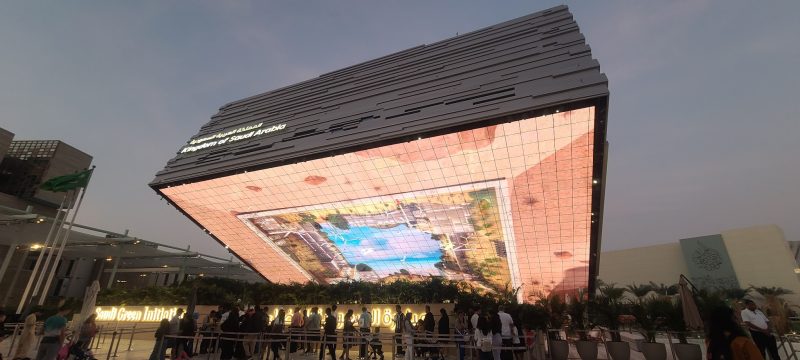
Saudi Green Initiative
The Saudi Green Initiative hosted a towering pavilion at COP28
Despite the lackluster progress, I left the conference feeling invigorated. Why? Well, for one thing, there’s a tremendous energy that comes from being around a hundred thousand people from across the planet trying to solve the same pressing challenge. There was also a groundswell of enthusiasm around climate tech startups, which played a much bigger role at COP28 than previous COPs.
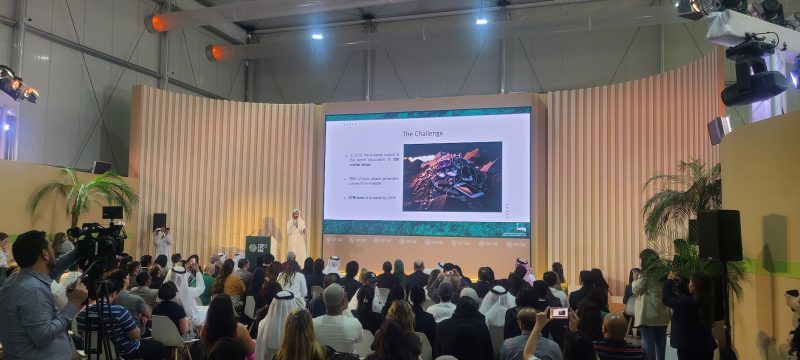
COP28 startup pitch
Demo Day for Ma’an Social Incubator, one of many startup pitch events at COP28.
The hosts of COP28 announced Innovate for Climate Tech, a global coalition supporting novel climate solutions, and the Martin Trust Center was proudly one of the initial collaborators. This coalition will continue to advocate for innovation at future COPs, with a focus on the Global South. COP28 put startups front and center throughout the event, with a cluster of booths called the Startup Village at the heart of the publicly accessible portion of the conference, known as the Green Zone.
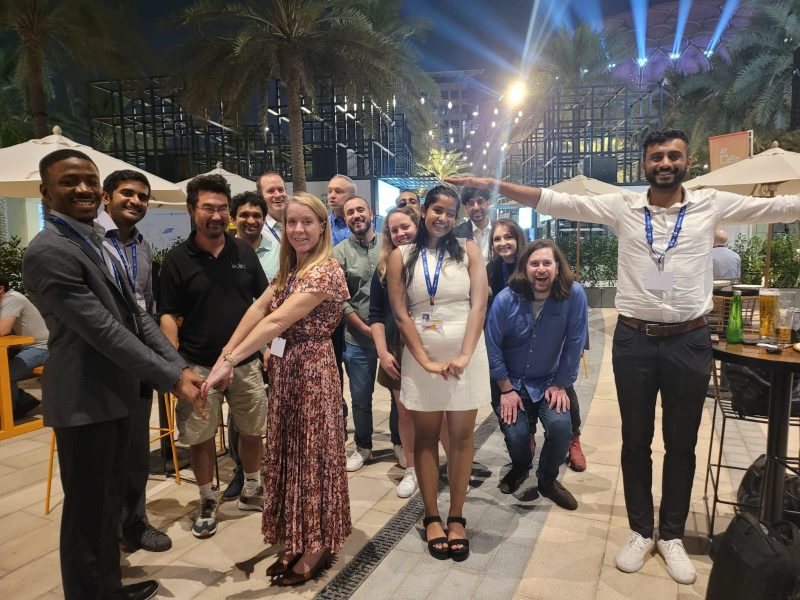
COP28 MIT happy hour
MTC hosted a happy hour for MIT students, staff, faculty, and alumni at COP28.
It was also heartening to hear the work of the MIT community. At the suggestion of our senior advisor and all-around climate guru Tod Hynes, the Martin Trust Center convened a happy hour at COP28 for MIT students, staff, faculty, and alumni. I was blown away by the work that everyone was doing. MIT community members had been hard at work alongside policy makers, analyzing data and explaining the latest technologies.
This spirit of climate action pervades MIT, and this is strongest back home on campus. On February 8, President Kornbluth announced The MIT Climate Project, a solutions-focused, whole-of-MIT effort to leverage the unique resources and capabilities of the Institute to address what she called in her inaugural speech “the greatest scientific and societal challenge of this or any age.” To support this project, the Trust Center will play a key role in bringing solutions developed at MIT out into the world.
The best time to act was yesterday, and the second-best time to act is now, so we’ve got big plans starting right way. Last week, I kicked off a semester-long program called “The Dirt Road: Climate and Energy Entrepreneurship,” in which 25 students will intensively explore unsolved problems and high-impact opportunities in climate. This program will fill an important gap for students who are passionate about pursuing entrepreneurship as a route to climate solutions but don’t know where to begin.
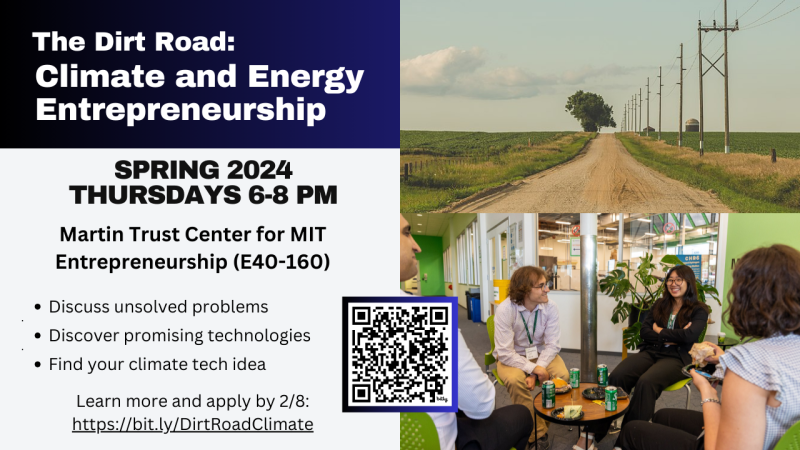
On February 27, we’ll be holding our next Climate Salon, following up on a similar event in the fall. At this upcoming salon, the community at and around MIT will gather in small groups to discuss how narrative and design can boost the impact of climate action.
Later in the spring, we’ll also be resuming the Innovation for a Warming Planet series, and we are aiming to do another climate-themed Pitch2Match, most likely in April around Earth Day.
Even the smallest actions make a difference. If you’ve been to the Trust Center lately, you may have noticed that we got rid of our disposable cups on Valentine’s Day (to show our love for the planet). From now on, we’ll be BYOC. Given the amount of free coffee that we provide to our community, this will lead to a big reduction in waste!
Climate action has never been more urgent. If you’re enthusiastic about tackling climate change through entrepreneurship, then stop by the Trust Center to figure out how to make your ideas a reality. And bring a re-usable mug!
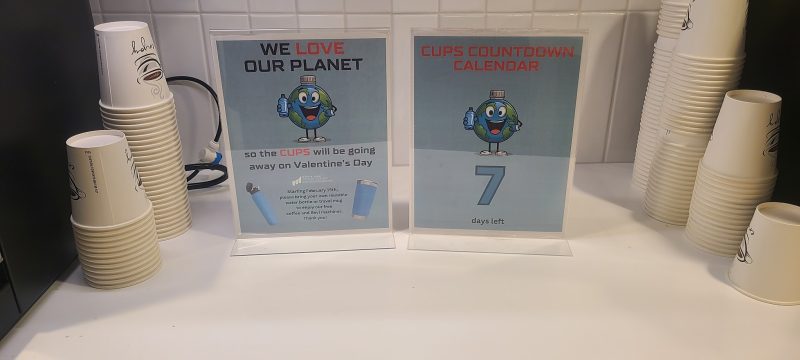
Cup Countdown
The Trust Center got rid of disposable cups on Valentine’s Day (to show our love for the planet).


Follow